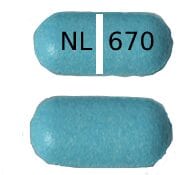Uses
Pentazocine is used to relieve moderate to severe pain. Pentazocine is in a class of medications called opiate (narcotic) analgesics. It works by changing the way the brain and nervous system respond to pain.
Side Effects Of Pentazocine
Pentazocine may cause side effects. Tell your doctor if any of these symptoms are severe or do not go away:
- feeling very tired
- lightheadedness
- drowsiness
- mood changes
- headache
- upset stomach
- constipation
- stomach pain
- rash
- difficulty urinating
Some side effects can be serious. If you experience any of the following symptoms, call your doctor immediately:
- difficulty breathing
- changes in heartbeat
- agitation, hallucinations (seeing things or hearing voices that do not exist), fever, sweating, confusion, fast heartbeat, shivering, severe muscle stiffness or twitching, loss of coordination, nausea, vomiting, or diarrhea
- nausea, vomiting, loss of appetite, weakness, or dizziness
- inability to get or keep an erection
- irregular menstruation
- decreased sexual desire
- fainting
Pentazocine may cause other side effects. Call your doctor if you have any unusual problems while you are taking this medication.
Warnings & Precautions
Before taking pentazocine:
- tell your doctor and pharmacist if you are allergic to pentazocine, naloxone, any other medications, or any of the ingredients in pentazocine tablets. Ask your doctor or pharmacist for a list of the ingredients.
- tell your doctor and pharmacist what prescription and nonprescription medications, vitamins, nutritional supplements, and herbal products you are taking or plan to take. Be sure to mention any of the following: medications for migraine headaches such as almotriptan (Axert), eletriptan (Relpax), frovatriptan (Frova), naratriptan (Amerge), rizatriptan (Maxalt), sumatriptan (Alsuma, Imitrex, in Treximet), and zolmitriptan (Zomig); medications for cough, cold, or allergies; 5HT3 serotonin blockers such as alosetron (Lotronex), dolasetron (Anzemet), granisetron (Kytril), ondansetron (Zofran, Zuplenz), or palonosetron (Aloxi); selective serotonin-reuptake inhibitors such as citalopram (Celexa), escitalopram (Lexapro), fluoxetine (Prozac, Sarafem, in Symbyax), fluvoxamine (Luvox), paroxetine (Brisdelle, Prozac, Pexeva), and sertraline (Zoloft); serotonin and norepinephrine reuptake inhibitors such as desvenlafaxine (Khedezla, Pristiq), duloxetine (Cymbalta), milnacipran (Savella), and venlafaxine (Effexor); tramadol; trazodone (Oleptro); and tricyclic antidepressants (‘mood elevators’) such as amitriptyline, clomipramine (Anafranil), desipramine (Norpramin), doxepin (Silenor), imipramine (Tofranil), nortriptyline (Pamelor), protriptyline (Vivactil), and trimipramine (Surmontil). Also, tell your doctor or pharmacist if you are taking or receiving any of the following medications or have stopped taking them within the past 2 weeks: monoamine oxidase (MAO) inhibitors such as isocarboxazid (Marplan), linezolid (Zyvox), methylene blue, phenelzine (Nardil), rasagiline (Azilect), selegiline (Emsam, Eldepryl, Zelapar), and tranylcypromine (Parnate). Many other medications may also interact with pentazocine, so be sure to tell your doctor about all the medications you are taking, even those that do not appear on this list. Your doctor may need to change the doses of your medications or monitor you carefully for side effects.
- tell your doctor what herbal products you are taking, especially St. John’s wort.
- tell your doctor if you have or have ever had problems urinating; seizure disorders; lung, liver, kidney, thyroid, gallbladder, or heart disease.
- tell your doctor if you are breastfeeding.
- you should know that this medication may decrease fertility in men and women. Talk to your doctor about the risks of taking pentazocine.
- talk to your doctor about the safe use of this medication if you are 65 years of age or older. Older adults should not usually take pentazocine because it is not as safe as other medications that can be used to treat the same condition.
- if you are having surgery, including dental surgery, tell the doctor or dentist that you are taking pentazocine.
- you should know that this medication may make you drowsy. Do not drive a car or operate machinery until you know how this medication affects you.
Dosage Of Pentazocine
Pentazocine comes as a tablet to take by mouth. It usually is taken every 3 to 4 hours as needed. Follow the directions on your prescription label carefully, and ask your doctor or pharmacist to explain any part you do not understand. Take pentazocine exactly as directed.
Pentazocine tablets should be taken by mouth. Do not try to dissolve and inject the tablets. Injecting pentazocine may cause serious health problems or death. Naloxone is added to the tablets so that people who inject dissolved tablets will not experience the desired effects of pentazocine.
Other
Keep all appointments with your doctor and laboratory. Your doctor may order certain lab tests to check your body’s response to pentazocine.
Before having any laboratory test (especially those that involve methylene blue), tell your doctor and the laboratory personnel that you are taking pentazocine.
Do not let anyone else take your medication. Pentazocine is a controlled substance. Prescriptions may be refilled only a limited number of times; ask your pharmacist if you have any questions.
It is important for you to keep a written list of all of the prescription and nonprescription (over-the-counter) medicines you are taking, as well as any products such as vitamins, minerals, or other dietary supplements. You should bring this list with you each time you visit a doctor or if you are admitted to a hospital. It is also important information to carry with you in case of emergencies.
Source
All information has been provided courtesy of MedLinePlus from the National Library of Medicine and from the FDA.



